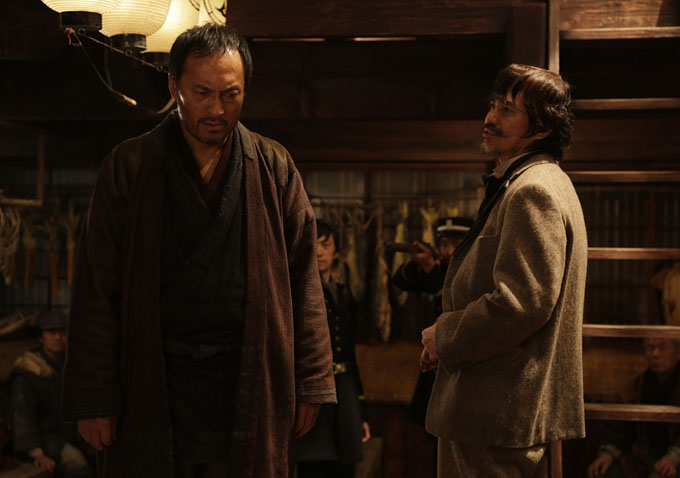
Lord knows that, over the years, Hollywood has plundered its fair share of Japanese cinema. From the appropriation of “Godzilla,” “Seven Samurai” turning into “The Magnificent Seven,” to the long run of J-horror re-dos, to—only last week—the announcement of a DreamWorks version of Cannes film “Like Father Like Son,” there aren’t many major and successful Japanese movies that haven’t been at least developed as a remake. So it only seems fair that the favor should be returned at some point, and what could be a better way of doing so than by remaking one of the greatest films by Clint Eastwood, whose own star was launched when “Yojimbo” was remade as “A Fistful Of Dollars.”
“Unforgiven” is, as the name might suggest, a remake of Eastwood’s 1992 Oscar-winning revisionist Western, which we’d still argue is probably his finest hour as a director and as an actor. Here, Lee Sang-il, director of “Hula Girls” and “Villain” writes and directs the new version, moved to Japan in the late 19th century, with Ken Watanabe, one of the actors most immediately associated with samurai roles at home (and a familiar face to Western audiences thanks to his roles in “The Last Samurai,” “Batman Begins” and “Inception“) taking on the lead role.

Mostly set on the relatively untamed Northern Island of Hokkaido, a decade of so after the war between the Emperor and the Shoguns (which the latter lost), the plot is, beat-for-beat, almost identical to that of its inspiration. Watanabe plays Jubei, a former Samurai with a reputation for killing women and children who, since the end of the war, has retired to be a farmer, raising two children after the death of his wife.
But one day, a blast from the past arrives in the shape of former comrade Kingo (Akira Emoto), who has a proposition—after one of their number was scarred by a pair of no-good settlers, a group of prostitutes have placed a thousand-yen bounty on the attackers’ heads. Facing a tough winter, Jubei reluctantly agrees, and the pair set off, picking up a hot-headed aspiring killer (Yuyu Yagira) along the way. But they soon discover that the town is run by old adversary Ichizo (Koichi Sato), who will go to any lengths to stop vigilante justice overrunning his town.
There are a few slight differences, beyond the obvious setting—the part of the wounded prostitute is bumped up, the equivalent to The Kid is introduced a little later, and he’s also a member of the indigenous Ainu people, the persecution of whom becomes something of a recurring motif over the film. But otherwise, it’s incredibly faithful, to the extent that Emoto, playing the equivalent to Morgan Freeman‘s part in the original, looks strangely like Freeman. Except, you know, Japanese (it’s actually less off-putting than the resemblance between Yagira’s character and Russell Brand, which is probably much less deliberate).

Lee has certainly done a solid job at capturing the tone of the original—it’s soulful and elegiac for the most part, although there are a few slapstick-y moments, which probably play better with the home crowd used to such tonal lurches in their samurai flicks. It also looks superb: Warner Bros. backed the film, so there’s serious production value behind it, and Norimichi Kasamatsu‘s photography makes full use of the Hokkaido setting and, particularly in the snowbound scenes, looks legitimately gorgeous.
Taken in its own context, it’s a solid, if unremarkable samurai picture. But if you’re even vaguely familiar with the Eastwood original, it’s so familiar that it’s hard to see the point. Lee copies every character and beat from his inspiration (there’s even a Saul Rubinek-ish writer character), and it ends up feeling less like a remake than a cover version.
And like most cover versions, it just ain’t the same without the original vocalist. Watanabe is fine, but he seems at times to be doing a growling impersonation of Clint. Perhaps more importantly, his casting doesn’t, at least for Western audiences, have the same resonance as seeing Eastwood turn the genre on which he made his name on its head. Again, in Japan, where Watanabe worked for decades in samurai film and TV, it might be more evocative, and there’s every chance the film will prove a sizeable hit there. But if you know the 1992 “Unforgiven” at all, it’s likely that you’ll find that the 2013 take has a little difficulty escaping from its predecessor’s shadow. [B-]
Browse through all our coverage of the 2013 Venice Film Festival to date by clicking here.

